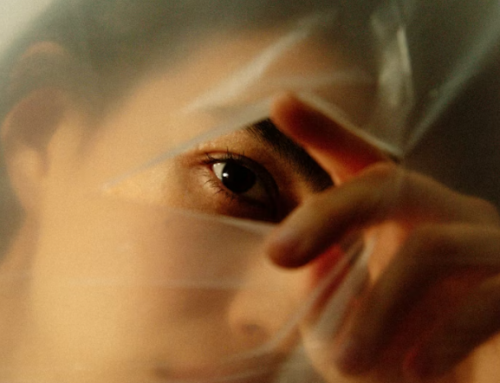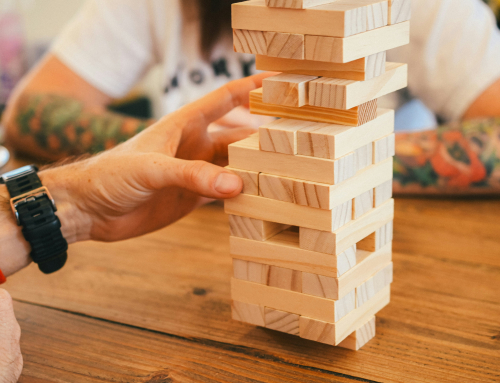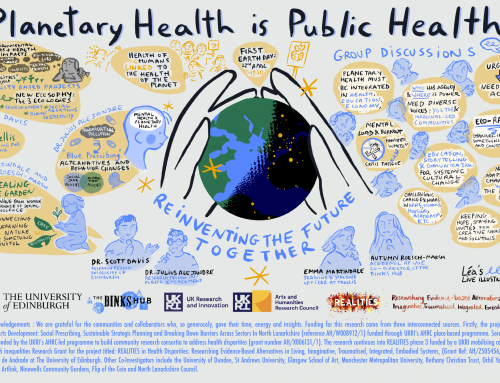By Deborah McArthur
Deborah McArthur is North Lanarkshire Council’s Arts Development and Engagement Manager, as well as the community-embedded researcher for REALITIES North Lanarkshire Hub. This hub is foundational hub of the project which began with Art is Everywhere (also known as Phase 1 of REALITIES), funded by the AHRC’s Place-Based Programme.
I’m not a researcher. I wouldn’t say I’m very academic. My interest is in people and building meaningful relationships. My background is in the arts, specifically in participatory arts practice, and even more specifically drama and theatre. Creativity is the tool I use for connection, reflection, and change. It enables me to work alongside communities to co-create, explore, and express the topics and issues important to them. Stepping into the Community Embedded Researcher role with REALITIES, I’ve learned about participatory action research, and I see how naturally it aligns with the values and approaches I work with every day.
Participatory action research, like participatory arts, is about collaboration. It’s about shifting power, valuing lived experience, and creating space for people to shape the narrative. That’s why it resonates so strongly with me. It’s not about experts coming in to diagnose problems, it’s about communities exploring the issues that matter to them, together. It invites people to be part of the process, to ask the questions, gather the insights, and co-create the solutions.
In both fields, I’ve seen how systems, whether in health, housing, education, or social care, can create barriers that deeply impact people’s wellbeing. These barriers are often invisible to those who design the systems, but painfully clear to those who live within them. What participatory approaches offer is a way to reimagine those barriers. Through dialogue, creativity, and shared inquiry, people can begin to see new possibilities and devise new ways forward. In my work, I’ve seen how powerful it is when people feel heard and involved. Participatory action research offers that same sense of ownership and agency. It empowers individuals and communities to explore the issues that matter most to them, and to do so in ways that are meaningful and grounded in their reality. That’s why connecting with REALITIES has been extremely rewarding. Being able to connect my practice and share with the Consortium has opened new ways of thinking and has impacted how I approach my work.
In North Lanarkshire, we have delivered Creative Hub sessions across the authority. These sessions invite anyone ‘new to NL’ to engage in drama, music and craft activities to explore the broken systems that are having a detrimental impact on their health and wellbeing and exacerbate the existing health inequalities these communities face. Through a series of workshops, we explored the themes of identity, reimagine, and reconstruct. These creative sessions supported community members to find their own meaning within these themes, explore what change would look and feel like to them, and bring these ideas right down to the granular level for action to take place. This process ensures what we do next will have impact on those who need it most.
So, what are we doing next? The communities we engaged with identified ‘welcome’ was missing for them when they first came to the local authority. The idea of welcome was explored through the lens of our Creative Hub workshop themes, and we uncovered, the absence of welcome had a negative effect on people’s health and wellbeing, they didn’t know where to seek support, or whether it was ok to ask for it, and they shared they were unsure whether information they had found out was even factual. As we codesign creative welcome sessions for anyone ‘new to NL’ we understand the vital need to have lived experience at the table shaping this. The potential for real change is tangible. When people are part of the process, the outcomes are more relevant, more visible, and more likely to stick.
For those of us working in the arts, this Participatory Action Research approach isn’t a stretch, it’s a natural extension of what we already do. Participatory research and participatory arts both start from the same place: trust, collaboration, and a belief in the power of people to shape their own stories. We are at the early stages of this codesign process but the engagement, enthusiasm, and expertise around the table tells me we will deliver something useful for the communities of North Lanarkshire.





